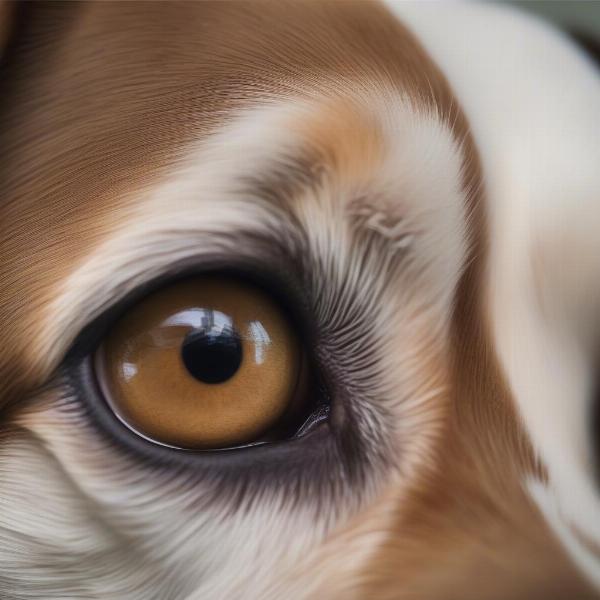Hazel eyes in dogs are a captivating and relatively uncommon phenomenon. They add a unique and intriguing touch to a dog’s appearance, sparking curiosity and admiration in many. But what exactly causes hazel eyes, and what breeds are they most common in? This article explores the fascinating world of hazel dog eyes, delving into the genetics, breeds, and care considerations surrounding this beautiful eye color.
Hazel eyes are a result of a combination of pigments, specifically eumelanin (brown/black) and pheomelanin (red/yellow). The specific ratio and distribution of these pigments within the iris determine the final eye color, creating the characteristic hazel hue, a mixture of brown, green, and gold. This intricate interplay of genetics makes predicting eye color in puppies, especially mixed breeds, a challenging task. While some breeds are more predisposed to hazel eyes, it’s important to remember that genetics can be unpredictable.
Decoding the Genetics of Hazel Eyes in Dogs
The genetics behind hazel eyes are complex and involve multiple genes. While not fully understood, we know that genes like TYRP1, MC1R, and ASIP play crucial roles in melanin production and distribution. These genes interact in various ways, resulting in a wide spectrum of eye colors, including hazel. This explains why two dogs with hazel eyes can have subtly different shades, ranging from a light, greenish-hazel to a deep, almost amber hue.
Breeds Commonly Associated with Hazel Eyes
Although hazel eyes can appear in many breeds, they are more prevalent in certain ones. The Australian Shepherd, Weimaraner, and American Pit Bull Terrier are some examples of breeds where hazel eyes are relatively common. Other breeds that occasionally exhibit hazel eyes include the Dachshund, Beagle, and Pomeranian. It’s crucial to remember that breed standards often dictate preferred eye colors, and hazel eyes may be considered a fault in some show rings.
Caring for Hazel-Eyed Dogs
While hazel eyes themselves don’t require any special care, maintaining overall eye health is essential. Regular vet checkups can help detect potential issues like cataracts, glaucoma, or infections. Just like any other eye color, hazel eyes can be susceptible to irritation from dust, pollen, or other environmental factors. wipes for dogs eyes can be helpful in gently cleaning the area around the eyes.
Are Hazel Eyes an Indicator of Health Issues?
There’s no direct correlation between hazel eyes and specific health problems. However, certain eye conditions, like heterochromia (different colored eyes) and certain forms of cataracts, can sometimes cause changes in eye pigmentation, leading to a hazel-like appearance. It’s always best to consult a veterinarian if you notice any changes in your dog’s eye color or appearance.
 Hazel Eyes and Dog Health
Hazel Eyes and Dog Health
Conclusion
Hazel dog eyes are a beautiful and intriguing result of genetic variation. While certain breeds are more prone to this eye color, the genetics of eye color can be complex and unpredictable. dogs and witch hazel While hazel eyes themselves don’t necessitate special care, regular veterinary checkups are crucial for maintaining overall eye health. By understanding the genetics and care considerations, you can appreciate the unique beauty of hazel dog eyes and ensure your furry friend’s ocular health.
FAQ
- Are hazel eyes rare in dogs? Yes, relative to brown or blue eyes, hazel is less common.
- Can two brown-eyed dogs have a hazel-eyed puppy? Yes, it’s possible if both parents carry the recessive genes for hazel eyes.
- Do hazel eyes change color as a dog ages? Slight changes in shade can occur, but drastic changes should be checked by a vet.
- Are hazel-eyed dogs more prone to eye problems? No, hazel eyes themselves don’t indicate a higher risk of eye diseases.
- How can I tell if my dog’s hazel eyes are healthy? Regular vet checkups are the best way to monitor eye health. witch hazel for dogs
ILM Dog is your go-to resource for expert advice on dog breeds, health, training, nutrition, grooming, and much more. We are passionate about providing dog owners with reliable, practical information to help them provide the best possible care for their canine companions. Whether you’re a seasoned dog owner or just starting your journey, ILM Dog is here to support you every step of the way. Contact us today for personalized advice and explore our extensive resources! Email: [email protected], Phone: +44 20-3965-8624. Visit us at ILM Dog for all your dog-related needs!